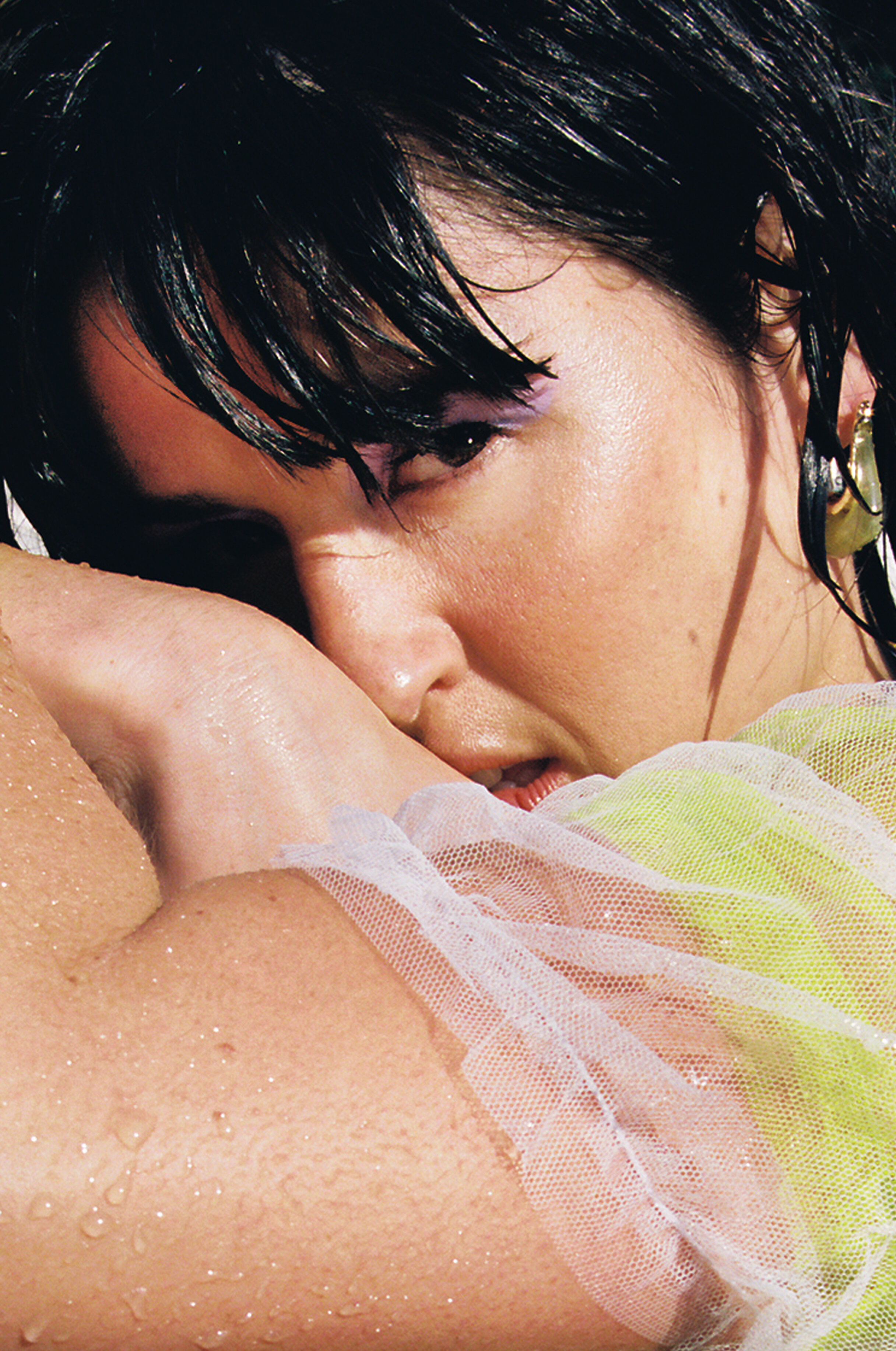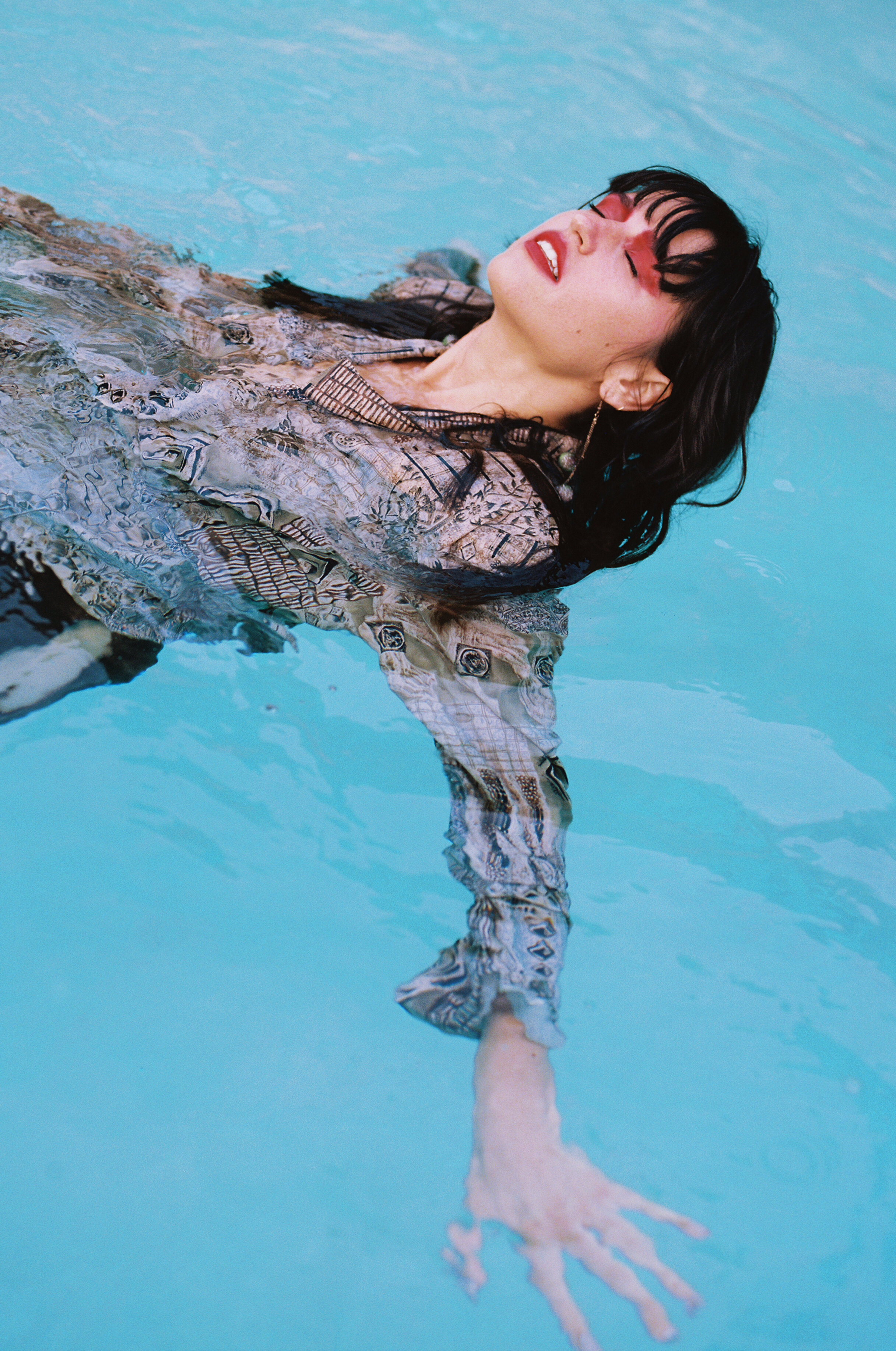Rozzi: Sharing Secrets
⤏ IN CONVERSATION WITH GISSELLE PERNETT
⤏ PHOTOS BY BROOKE NÖELLE
⤏ STYLING BY KORI HULSE | MAKE-UP BY T’AI RISING MOORE | PHOTO ASSISTANCE BY BIANKA ST. JUSTE
If you’ve listened to Rozzi’s music, you probably know more of her secrets than you think you do. From writing about the lucky underwear kept in her memory box to singing about not wanting to run into THAT ex at a party (we all have one), Rozzi embraces the uncomfortable. Part 1 of her latest album, Hymn for Tomorrow, is 24 minutes of vulnerability in the forms of heartbreak, anger, acceptance and healing. In addition to being an overall inspiring individual, she has the work ethic of Miranda Hobbes and picks Big over Aidan, obviously!
GP: Your music has been described as if it were a conversation with somebody you trust, did being vulnerable always come that easy to you?
R: No. I still think I lean on songwriting to be vulnerable when I might otherwise not feel comfortable being that open. I actually had to teach myself to do that even with songwriting. I used to feel very nervous going into a room with strangers when I was going to write with them and be like, “Here’s everything that’s going on in my life and everything I’m feeling.” It’s not natural to me to do that which is why I started writing poems before I go in. I'll write entire lyrics before I go into the writing room. Otherwise, I just won’t tell them the truth. I’m actually a little bit more shy than I’ve taught myself to be.
I think the biggest lesson I had to learn was that vulnerability is strength. Keeping yourself locked in to keep yourself “safe” is not strength, that’s a lie. I actually think it’s the opposite. Being vulnerable, expressing how you feel, being open takes a lot more courage. I had to really understand that. My biggest hope would be that when people hear my songs, they feel empowered to show themselves.
GP: I’m assuming most of these songs come from stories and real life events. How do you decide what moments you’re going to write about or what moments are like, “I’m not ready to talk about that yet?”
R: The truth is, the more uncomfortable I feel talking about it, the more I need to write about it. I definitely have had times where I’m like, “Oh fuck, I can’t say that! I guess that means I have to say that!” [Laughs] There is no distinction between the two. It's a catharsis and it’s like a tool for mental health. Sometimes the night before a song comes out I’m like, “What have I done! I can’t believe I’m going to tell everybody this!” It is a little scary.
GP: Have you always been writing?
R: Yeah, I think I have! I think like a lot of things in life it’s something that’s in you. Then puberty and adolescence knocks it out of you and you have to kind of reconnect to your childhood self. I wrote poems, always as a kid. I tried to sell books of my poetry [laughs]. I think when I was in high school and college I got convinced by people around me — and by voices of fear within myself — that I wasn't as much of a writer as am. I kind of lost touch with it. I almost had to reconnect, you know. I think that happens to people. There's something about teenage-hood that makes you hate things about yourself and not believe in yourself.
“The truth is, the more uncomfortable I feel talking about it, the more I need to write about it.”
GP: Oh, definitely!
R: I kind of forgot I was a writer and I had to reconnect to it later. I always did write.
GP: I think that’s when you know you’re meant for something. Do you have a writing ritual?
R: Yes! I like to do it first thing in the morning. I want an early morning to just vomit my thoughts and organize them. That’s my main ritual. Although, I also have created the habit of staying alert for something that feels like a song coming in a whisper. As a writer yourself you must have that feeling. It’s like the muse. I’ll be out with my friends and the muse will kind of whisper an idea and I have to make sure I write that idea down. Then the next morning when I’m caffeinated and alone I’ll expand on the idea. The morning ritual and then the ability to pay attention to the inspiration when it hits you.
GP: Definitely, I feel like I'll start writing something in my head and I’ll be like “Oh my god that’s good I’m going to write it down” and then I don’t so I just forget it.
R: You can’t do that! But I will say sometimes I wake up to a weird poem I wrote in my sleep that is so bad. [Laughs] I remember thinking at 3 a.m. “Oh my god I have a genius idea if I don’t write this down right now I’ll lose it.” Then the next morning I read it and not only is it not good but it makes no sense.
GP: Instead of asking what inspires you. I’m going to ask who inspires you?
R: So many people. My boyfriend really inspires me. He’s just constantly creating for the sake of creating and his love of art is really inspiring to me. I’m really grateful to my dad for instilling a really intense work ethic. You know, you plan, you have goals and you set them and you follow through. I’m very responsible because of that.
I’m also really inspired by Kacey Musgraves new album, I know you said who and not what, but talk about taking your personal life and making something that will help millions of people. I just find that so inspiring. She’s going through this whole divorce and writes this whole record I can’t stop listening to. It reminds me of Stevie Nicks writing about her boyfriend who’s two feet away from her playing guitar. I’m just really inspired by that kind of bravery.
”[the new kacey musgraves album] reminds me of Stevie Nicks writing about her boyfriend who’s two feet away from her playing guitar. I’m just really inspired by that kind of bravery.“
GP: Do you have a favorite lyric or lyrics from Hymn for Tomorrow? My personal favorite is, “I’ll show you my heart and I’ll beg you to take it.” It hurts but it’s so relatable and so true!
R: [Laughs] Thank you! I’m so glad you pointed out that song! I think that’s the song — If I’m Going To Love You — as a songwriter that I’m most proud of. I think my favorite is also from that song: “My type is someone who looks good in red flags.” I was proud of that lyric. I’m not proud of that quality in myself but I am proud of that lyric.
GP: I’ve also listened to your podcast, Ugh! You’re So Good, with Scott Hoying from Pentatonix. It’s only right that I ask you: Ugh! How are you so good?!
R: That is one of the most fun things I’ve ever done! Thank you for listening. I never feel I’m as good as I want to be is my first answer. If I’ve ever gotten good at something, it’s because I’m obsessed with practicing. I really am obsessed with singing. I’m obsessed with my heroes. I’ve learned live Aretha Franklin albums note for note. I’ve learned live Beyonce albums note for note. I love to practice, I really do and I love to be prepared. That makes me sound kind of like a nerd and it’s not very “rock and roll,” but I really believe in studying your heroes. I’ve had to practice being vulnerable. I have to start every morning writing how I am feeling in order to start opening those doors. It’s a muscle.
GP: Music is therapeutic. Do you ever feel like once you’ve put out a song it’s like a weight has been lifted off your shoulders? Is there a healing moment in that?
R: Yes! That’s so intuitive of you. I find that I have a pulsing feeling when I haven’t yet released songs that need to be released. Like writing the song is part of the process, singing the song is part of the process, finishing the song is part of the process, and then releasing it is truly the end of it. There is something about releasing a song that closes a chapter on that experience.
It is healing and it’s also very comforting because sometimes — like when you quoted one of my own lyrics to me — it’s nice to know I’m not alone in that feeling.
“I’m a little bit impossible to satisfy in a lot of ways.”
GP: That’s so interesting! I’ve never actually thought about it that way. It’s kind of like a two way street for healing. The artist feels heard, but so does the audience.
R: Exactly! I really really love that feeling of connection.
GP: Going back to your podcast, it might have been the episode where you and Scott took the Enneagram test, you briefly talked about failure. How do you handle failure when it’s in front of an audience?
R: I struggle with it. I’m tough on myself. I really have high expectations for myself and I want so much. I’ve always been that way. I’m a little bit impossible to satisfy in a lot of ways. I think what I have learned is, failure is not really failure. There have been so many instances in my life where something hasn’t gone the way I wanted it to and it ended up leading me to something much more important. Maybe a song didn’t do as well as I wanted it to do, but that led me to a different level of artistry where I can write better than I ever could before. I can write more freely than I could before because I didn’t feel the constraint of trying to have a hit, I just wanted to express myself. Those kinds of long lasting successes sometimes have come directly out of stuff that felt like a failure. Just keep going, that's really all you can do.
GP: To not end this on failure, even though failure is good to talk about! What’s your favorite part of all of this?
R: Singing for people. Just connecting. I love to sing and I love to sing in person. I’m going on my first headlining tour ever next month, and I feel so nervous and so excited. Failure and success are so closely linked, that I would say anxiety and excitement are also impossible to separate. But that is my favorite thing in the world, of anything in my life. It’s getting to stand in front of someone and sing for them and feel them connect and feel me connect and having this deep link between me and a stranger.
GP: Let’s play desert island. You’re only allowed to listen to three albums, what are they?
R: This is a mean question. The Miseducation of Lauryn Hill, Purple Rain, and Blue.
GP: Three artists — alive or deceased — you’d want to collaborate with?
R: Ariana Grande, I’m really speaking that into the universe as far as I can shout it. Justin Vernon from Bon Iver, I love his voice and he does these Bonnie Raitt covers that are so soulful. I want to sing with him very badly. And maybe, Jacob Collier. I would love to do a duet with him, maybe have him produce something. He’s just such a genius.
GP: Three things you can’t live without?
R: I can’t live without walking. I need to walk everyday and I can’t live without headphones. I need to listen to music everyday. And I can’t live without my family.
⤏ GISELLE PERNETT (SHE/HER) IS A LOS ANGELES BASED WRITER OBSESSED WITH POP CULTURE, EARLY MTV AND VH1 REALITY SHOWS AND CREATING ODDLY SPECIFIC PLAYLISTS. GISSELLE'S LOVE FOR MAGAZINES AND WRITING STARTED WITH A SUBSCRIPTION TO SEVENTEEN MAGAZINE AND A GENERAL DISLIKE FOR ANY OTHER SCHOOL SUBJECT. SHE ENJOYS TALKING TO PEOPLE AND HAS A LOVE-HATE RELATIONSHIP WITH HER VIRGO SUN SIGN.




